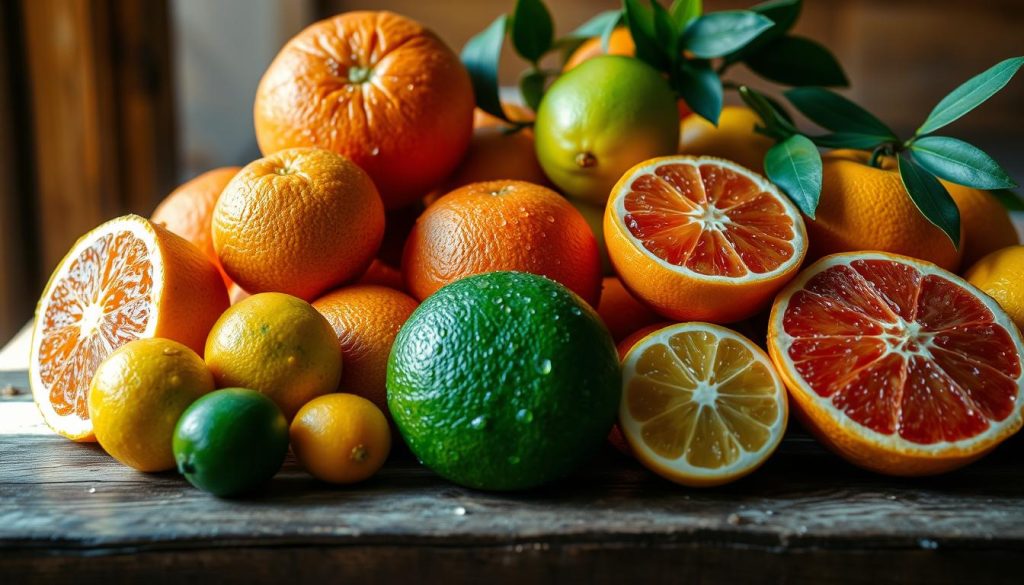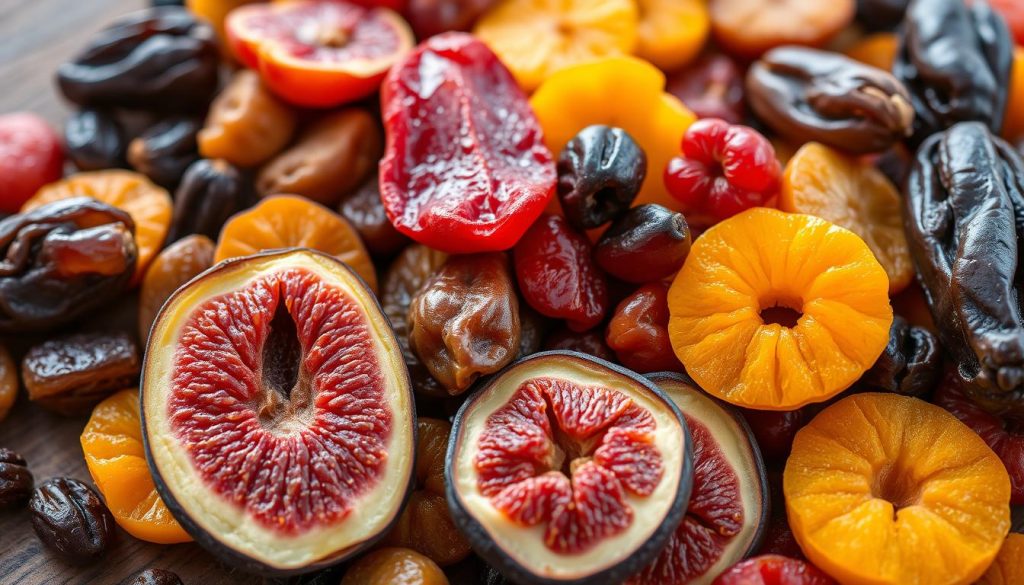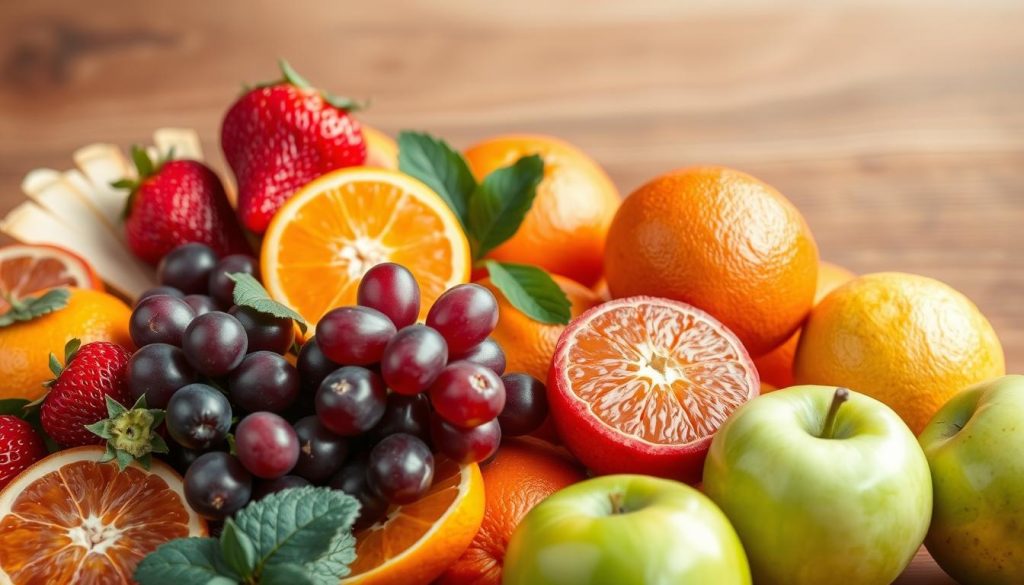Eating a variety of fruits and vegetables is good for your health. It might also help lower cancer risk. While no fruit can stop cancer alone, some have strong cancer-fighting powers. Studies on fruits and cancer show mixed results. Yet, fruits are full of nutrients and antioxidants that help during cancer treatment and can ease side effects.
In this guide, we’ll look at fruits that might fight cancer, based on the latest science. We’ll talk about berries, apples, and pears, and how they might help against different cancers. If you want to add more cancer-fighting foods to your diet or just want to know the latest, this guide is for you.
Key Takeaways
- Certain fruits, such as citrus, berries, and apples, have been linked to a reduced risk of various types of cancer.
- The cancer-fighting properties of fruits are often attributed to their high content of antioxidants, fiber, and other protective plant compounds.
- Regularly consuming a variety of fruits, including those high in vitamins, minerals, and phytochemicals, may help support overall health and potentially lower cancer risk.
- Incorporating more cancer-fighting fruits into your diet, whether fresh, frozen, or dried, can be a simple and delicious way to boost your intake of essential nutrients.
- Ongoing research continues to explore the complex relationship between fruit consumption and cancer prevention, highlighting the need for a balanced, nutrient-rich diet to support overall well-being.
Understanding the Role of Fruits in Cancer Prevention
Fruits are not just tasty; they also help fight cancer. They are packed with antioxidants and phytochemicals. These compounds help stop cancer cells from growing and protect us from free radicals.
The Science Behind Fruit’s Cancer-Fighting Properties
Fruits’ power against cancer comes from their complex mix of chemicals. Antioxidants like vitamins C and E fight off free radicals. These free radicals can harm cells and lead to cancer. Phytochemicals, meanwhile, slow down cancer cell growth and make these cells die off.
Key Nutrients That Combat Cancer Cell Growth
- Fiber: Helps keep our digestive system healthy and may lower colorectal cancer risk.
- Vitamins and Minerals: Give our bodies the nutrients it needs to fight cancer.
- Phytochemicals: Like carotenoids and flavonoids, have strong anti-cancer effects.
How Antioxidants Work Against Cancer
Antioxidants are key in the battle against cancer. They neutralize free radicals, which can damage DNA and cause cancer cells. By getting rid of these harmful molecules, antioxidants protect our cells and lower cancer risk.
“Eating a diet rich in fruits and vegetables is one of the best ways to reduce your cancer risk.” – American Cancer Society
Fruits That Can Reduce Risk of Cancer: Evidence-Based Research
Many studies have looked into how fruits affect cancer risk. A big study in Japan found that eating citrus fruits 3-4 times a week lowered cancer risk. Other studies have linked certain fruits to lower risks of lung, breast, and colon cancers.
But, we need more research to fully understand how fruits fight cancer. While fruits are good for us, other things like genes and lifestyle also matter. Cancer is complex, and many factors influence it.
Studies show that eating lots of fruits and veggies might lower cancer risk in the upper digestive tract. But, big studies haven’t found a strong link between fruits and veggies and lung cancer.
Research on colorectal, breast, and prostate cancers found little to no link with fruit and veggie intake. But, eating more fruits and veggies can cut the risk of mouth and throat cancers by 50%. People who eat a lot of these foods have a 40% lower risk of certain mouth and throat cancers.
Also, eating enough fruits and veggies might lower the risk of esophageal cancer. But, there’s no strong evidence that they help against stomach cancer.
While fruits can help fight cancer, other factors like genes and lifestyle are also important. Eating a variety of fruits and veggies is key to getting the most health benefits.
“Eating meals rich in vegetables, whole grains, beans, and fruit can help reduce the risk of cancer and chronic diseases.”
Powerful Berries and Their Cancer-Fighting Properties
Berries are more than tasty treats. They are packed with nutrients that fight cancer. These colorful fruits are full of anthocyanins. These pigments have strong antioxidant powers that may lower cancer risk.
Blueberries and Anthocyanins
Blueberries are loaded with antioxidants. They have anthocyanosides and resveratrol. Research shows these can stop cancer cells from growing and even kill them in some tumors.
Blackberries and Raspberries for Cancer Prevention
Raspberries get their dark red color from flavonoids. These compounds work with fiber to boost health and lower disease risk. Ellagic acid in raspberries might also fight certain breast cancers.
Blackberries are also full of anthocyanosides and other good stuff. They help strengthen the immune system and may lower cancer risk.
Strawberries’ Anti-Cancer Components
Strawberries are a vitamin C powerhouse. One cup gives you 100% of your daily vitamin C. Vitamin C boosts immunity and has anti-cancer effects. Strawberries also have antioxidants that protect cells from damage and prevent tumors.
Eating a variety of these berries is a tasty way to fight cancer. Try to eat about a cup of fresh berries three times a week for the best health benefits.
Citrus Fruits: Nature’s Cancer Shield
Citrus fruits like oranges, grapefruits, and lemons are nature’s secret weapon against cancer. These fruits are full of nutrients and compounds that help fight cancer. They can lower the risk of lung, breast, and digestive tract cancers.
The power of citrus fruits comes from their vitamin C and flavonoids. Vitamin C fights off harmful free radicals. Flavonoids have anti-inflammatory and anti-cancer properties.
The peel of citrus fruits is especially rich in these compounds. Citrus peels are cheap and abundant, making them a great source of cancer protection.
Studies show that eating citrus fruits regularly can lower cancer risk. The antioxidants in these fruits, especially in the peel, stop cancer from growing. They help by stopping cancer cells from moving, dying, and growing new blood vessels.
So, if you want to fight cancer, try eating more oranges or grapefruits. These fruits are natural powerhouses that could help you stay cancer-free.

“One in five people are expected to develop cancer during their lifespan. Citrus fruits, with their abundance of cancer-fighting nutrients, can play a vital role in reducing this alarming statistic.”
Eating more citrus fruits can help you fight cancer. They are full of vitamin C and flavonoids. These can help keep cancer away.
The Cancer-Fighting Power of Apples and Pears
Apples and pears are known for their health benefits. They may also help prevent cancer. These fruits have compounds that fight cancer cells.
White Flesh Fruits and Colorectal Cancer Prevention
A study showed that eating white fruits and veggies can fight colorectal cancer. The antioxidants in these fruits are key to their cancer-fighting power.
Quercetin and Polysaccharides Benefits
Apples and pears have two important compounds: quercetin and polysaccharides. Quercetin is an antioxidant that fights inflammation. Polysaccharides stop cancer cells from growing. Together, they offer strong protection against cancer.
| Fruit | Quercetin Content | Polysaccharide Content |
|---|---|---|
| Apples | High | Moderate |
| Pears | Moderate | High |
The table shows how apples and pears have different cancer-fighting compounds. This highlights their combined benefits in a healthy diet.
Eating apples and pears regularly can unlock their cancer-fighting power. This supports your health and well-being.
Green Fruits and Their Protective Effects
Green fruits like kiwifruit, honeydew melon, and grapes are key in fighting cancer. They are not just pretty to look at. They are also packed with nutrients and antioxidants that help prevent cancer.
Kiwifruit is especially noted for its cancer-fighting abilities. It has lots of antioxidants and helps keep the gut healthy. These help protect cells from damage that can lead to cancer.
But kiwifruit isn’t alone in its fight against cancer. Grapes, especially the purple and red ones, have a powerful antioxidant called resveratrol. This antioxidant helps prevent cell damage and slows tumor growth. Adding green fruits like honeydew melon and green grapes to your diet can boost your cancer-fighting efforts.
“Regularly consuming berries is associated with a lower risk of several types of cancers, including breast cancer and stomach cancer.”
Eating green fruits regularly can help you fight cancer naturally. It’s a great way to keep your body healthy and cancer-free.
Pomegranates and Their Anti-Cancer Properties
Pomegranates are becoming a key player in the battle against cancer. These colorful fruits are packed with antioxidants like punicalagins and ellagic acid. Early studies hint that pomegranates could be a great addition to a diet aimed at fighting cancer.
Understanding Pomegranate’s Antioxidant Power
Pomegranates are full of antioxidants, which are vital in fighting cancer. Research shows that pomegranate juice and extracts can slow down prostate tumor growth. They also help reduce estrogen levels in the body, which can slow breast cancer cell growth.
Research on Pomegranate and Cancer Cells
- Pomegranate extract may help lessen side effects of cancer treatments, like liver damage from cisplatin, animal studies suggest.
- Early human studies indicate pomegranate could help with heart disease, high cholesterol, and erectile dysfunction.
- While results on pomegranate and prostate cancer are mixed, a mix of green tea, pomegranate, broccoli, and curcumin may slow prostate cancer growth after treatment.
- Pomegranate might also help colorectal cancer patients by lowering inflammation and changing gene expression in colon tissues.
As scientists delve deeper into pomegranates’ role in cancer prevention and treatment, these fruits are showing great promise. They offer a natural, antioxidant-rich option for those looking to boost their diet.
Dried Fruits’ Role in Cancer Prevention
Eating dried fruits like prunes and raisins might help prevent some cancers. Research suggests they could even slow down cancer growth.
Studies found that eating 3 to 5 servings of dried fruits weekly can lower cancer risk. This is due to their high fiber and antioxidants, which fight cancer.
- An estimated 19.3 million new cancer cases occurred globally in 2020.
- About 10.0 million cancer deaths were recorded in 2020.
- The cancer burden is expected to increase by 47% to 28.4 million new cases in 2040.
- Approximately 50% of cancer cases can be prevented through factors like a healthy diet, physical activity, avoiding tobacco, and weight management.
- Up to 80% of cancer cases in high-income countries could be preventable.
- 1.6 million cancer deaths annually are attributed to suboptimal diets.
- About 5% of cancer deaths in the U.S. are due to low fruit and vegetable consumption.
The U.S. dietary guidelines suggest eating 2 cups of fruit daily. Dried fruits are a good choice, with ½ cup counting as 1 fruit. Yet, dried fruits make up less than 4% of the U.S. fruit intake.
Adding dried fruits to your diet can help prevent some cancers. It’s a simple way to boost your health and well-being.

Best Ways to Incorporate Cancer-Fighting Fruits Into Your Diet
To get the most out of fruits, I aim to eat a variety every day. I try to have 2-3 servings of fruit daily. This ensures I get a range of nutrients by choosing different colors like berries, citrus, apples, pears, and green fruits.
There are many ways to add these fruits to my meals. I love making smoothies, fruit salads, and even adding them to savory dishes. Dried fruits are also a great snack, packed with fiber and other good stuff.
While fruits are key, they’re just part of a bigger picture. I also make sure to eat lots of veggies, whole grains, and lean proteins. Small changes in my diet can add up. This helps me stay healthy and might even lower my cancer risk.


